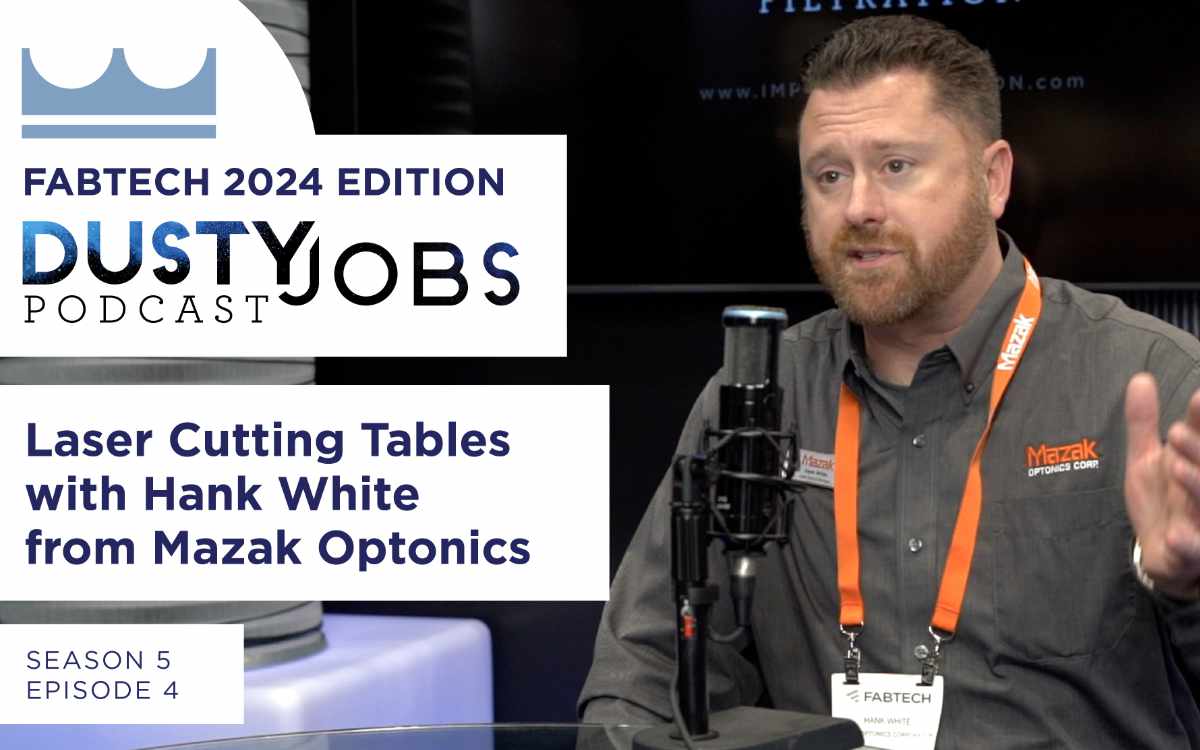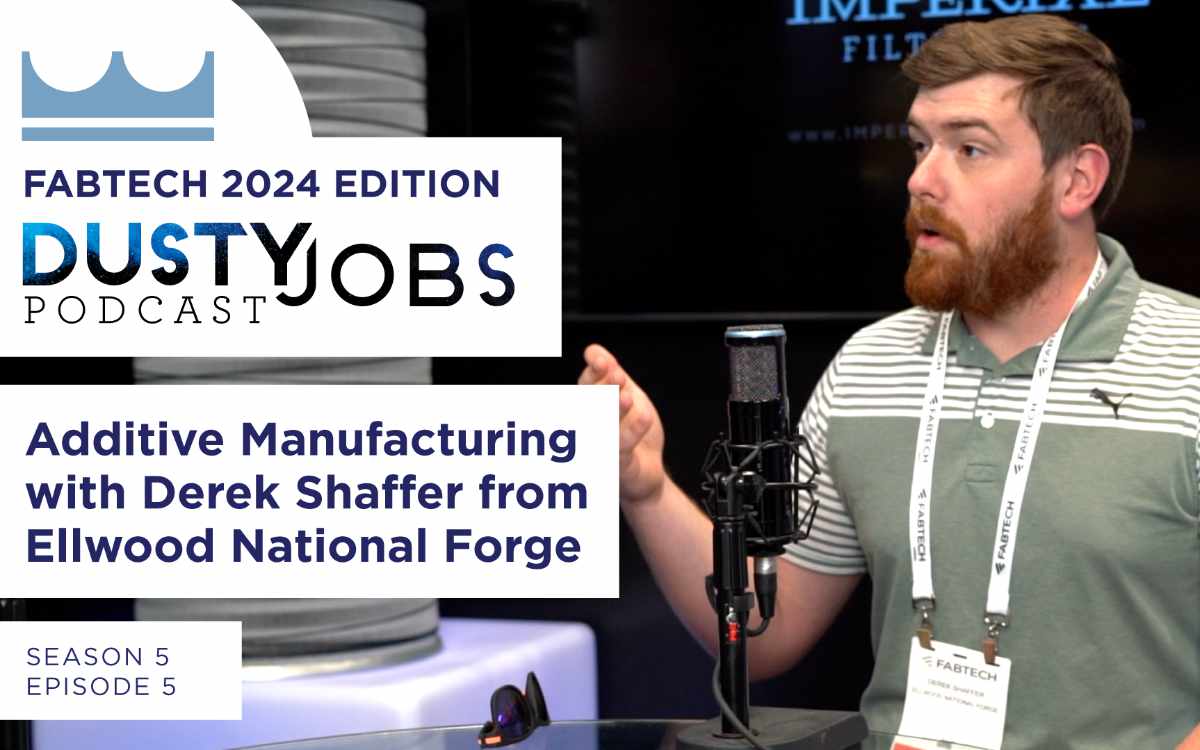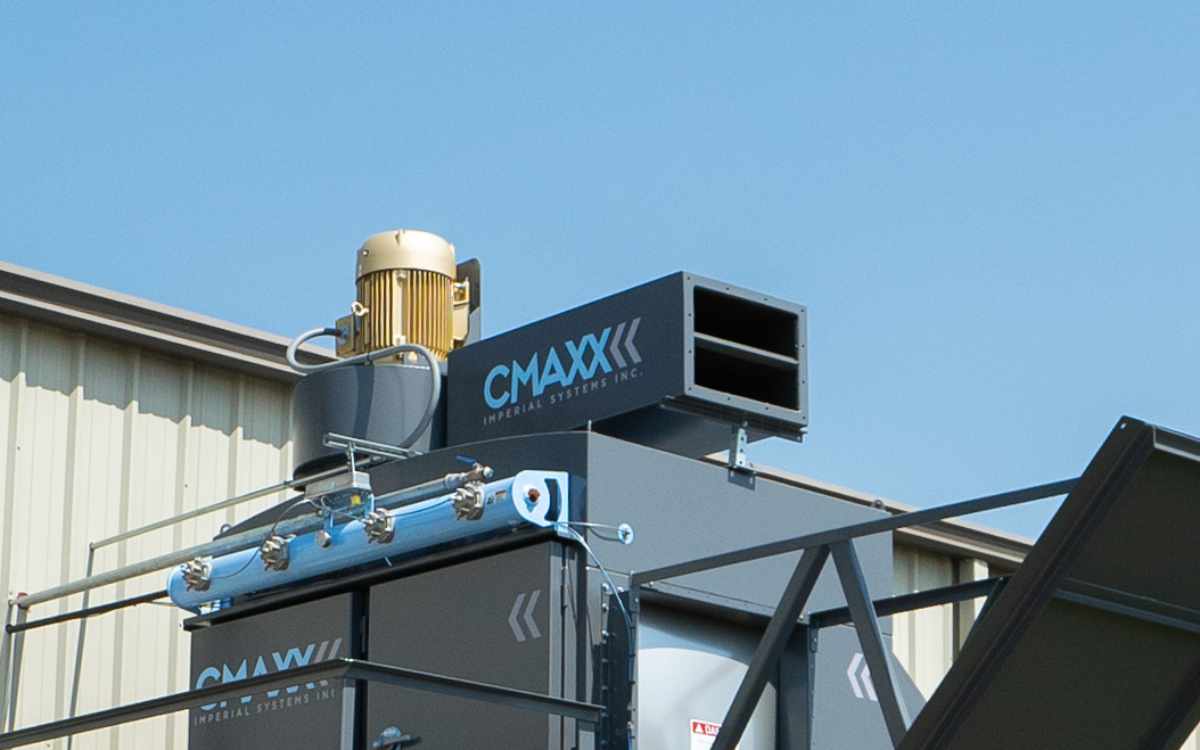In this podcast, we welcome President and CEO of Imperial Systems Jeremiah Wann to talk about the past, present, and future of the dust and fume collection industry. With almost twenty years of experience, Jeremiah has valuable insights into how our industry got to where it is today, and where it might go from here.
00:01 (MUSIC)
MITCH: Welcome to the Dusty Jobs Podcast from Imperial Systems. Industry knowledge to make your job easier and safer.
DONOVAN: Thanks for joining us again for the Dusty Jobs Podcast. This is Donovan Karki, the host. Today joining me is Jeremiah Wann. Jeremiah, how are you doing today?
JEREMIAH: Hey, I’m doing great. How are you doing?
DONOVAN: Doing good! We’re here at Imperial headquarters in Mercer again today, and Jeremiah, tell us a little bit about yourself.
JEREMIAH: Well, I’m the owner and CEO of Imperial Systems, started the company about twenty years ago, and this is my first podcast with Imperial Systems. This is fun. Dusty Jobs.
DONOVAN: We’re glad to have you on, we’re glad to have you on. So today what we’re going to be talking about is a little bit of your history, a little bit of the industry history, and at the end we’re going to talk about where we think things are going.
JEREMIAH: Right.
DONOVAN: So tell us, Jeremiah, what makes you qualified to tell us anything about dust collector history. Other than that you’re the owner of the company. But what’s your history that kind of gives you…
JEREMIAH: Yeah, I never really thought about it as being qualified, but I guess my… a little bit about my background is that, you know, I kind of got into this a little bit different than most people, you know, so I grew up in this industry. I’m third generation dust collection guy, you know?
DONOVAN: Yeah.
JEREMIAH: Sheet metal guy is what we were originally, but… my grandfather started back in, I don’t know what year, but he started back right out of the army, out of World War II doing sheet metal work in serial mills, and about the time my dad and my uncle were probably seventeen years old, and they started getting involved with the sheet metal shop there in Lapel, Indiana. And so that’s kind of a little bit about the history to that point. You know, I guess shortly after that, right out of college, I contacted my dad and said, “Hey, I’d like to go to work for you.” And he was, at the time, a manufacturer’s rep. So like we have reps today here…
DONOVAN: Yeah.
JEREMIAH: He was representing another brand of dust collector, and at the time, you know, I wanted to work with him. So…
DONOVAN: So then you came on as a rep too.
JEREMIAH: Essentially, yeah. Right away.
DONOVAN: So when you’re a rep, what all does that entail? What did you have to do?
JEREMIAH: Well, I mean, so the first thing he wanted me to do with me was to teach me autoCAD and to teach me air systems and how to design them. So I learned air flow, static pressures, cam velocities, internal velocities, and all these things we talk about today.
DONOVAN: Yeah.
JEREMIAH: And you hear… all this boring stuff we talk about. But it’s been my life for twenty-plus years professionally, and like I said, before that, growing up in a sheet metal shop from the time I can remember. It’s just kind of ingrained in me.
DONOVAN: Man, that had to be some really valuable knowledge you gained growing up, just being able to be in there with your grandpa, with your dad, seeing how everything’s built, and then being able to go out… you probably have such a better understanding of how a system goes together when you’ve been the guy who’s helped build it.
JEREMIAH: I think so. I mean, I still have people come to me a lot, you know, ask me for advice on different things, on systems, on equipment design, and today I’m still very, very involved in R&D, coming up with new products. And you know, it’s not just the way I was brought up, but it’s also just our daily experience around here, so yeah, it all helps for sure.
DONOVAN: Man, I know you said you didn’t ever think of yourself as qualified, but I think you’re more than qualified to give us some information about this topic. So that’s about you… now, so you were a rep with your dad… so, how did you get into building your own collector and just starting this company? How did that even come about?
JEREMIAH: Sure, well, you know… again, my background before that was growing up in sheet metal, so I understood. You know, we built ductwork and cyclones and baghouses, that kind of stuff. But you know, we worked together for about three years, and I don’t know if you ever saw Orange County Choppers… I don’t think it’s on anymore… but when that show came out, I’m like “Wow, my dad and I could have done the same thing,” you know, so I love him to pieces and today Thanksgivings are a lot better than they used to be, I can say that. But it’s one of those things where, you know, I’m kind of a bull-headed person and I definitely like to do things my way a little bit…
DONOVAN: Yeah.
JEREMIAH: And I think he’s kind of the same way, so we didn’t work together too well when we were in business together, but certainly we do on a day to day basis now. But you know, that being said, a few years after I started working with him, I started my own company. At that point I went to rep another line of equipment, and at that time still representing a company called Crestwood Recycling who makes wood shredders. So that’s kind of an odd twist, but did a lot in the shredder industry, which helps today a lot, because we’re talking about conveying materials and stuff. And so I had that experience. But when I got out of it, a little bit of the history of that was, if you remember, that was in 2001, so I got married in August of 2001, so… times were different back then, right?
DONOVAN: Yeah.
JEREMIAH: We had the attacks in September, and had just started the business, and…
DONOVAN: So we had September 11th, you got married, and you said, “Why not just start a business too?”
JEREMIAH: Yeah, and bought a house in the mix, too, so…
DONOVAN: Oh, man! You went all in.
JEREMIAH: Yeah, man, I started with my back against the wall, that’s what I like to say. So, you know, being a fighter that worked out well for me. It kind of pushed me. But you know, getting into the business… during those days, you know, I kind of got out thinking I was going to be able to set the world on fire and start making all kinds of sales right away. And then of course with the attacks, you know, you couldn’t get somebody on the phone. Everybody was pretty tied up with everything else that was going on. So within a couple years, you know, basically I said to my new wife at the time, I said… you know, we’re newly married at the time, and I said “In order to survive, I feel like we’re really going to have to start making some stuff.”
DONOVAN: Okay…
JEREMIAH: I said why don’t we… I knew how to make ductwork and cyclones and I knew design, so I said why don’t we start, we’ll buy some machinery and start building some stuff. So kind of the way it started out is, you know, it was kind of funny because, you know, working from home for a while, I was always big when I worked from home I still got dressed up like I was going to work, you know?
DONOVAN: Yeah.
JEREMIAH: It’s just a mentality thing. And I would basically get dressed for office work during the day and work eight, ten hours, and then at night I’d go roll ductwork and weld ductwork all night. I literally did that for about a year, and I would do that till 2:00 in the morning, then get up and do it all over again.
DONOVAN: Wow!
JEREMIAH: And so she would bring me dinner and whatever, and we would do that. And finally after I was just about to collapse, I said, “I gotta hire somebody”, and I could only afford one person. And so it’s… you know, the great American story, right?
DONOVAN: Yeah. And your first employee is still with us today, right?
JEREMIAH: Yeah, pretty close to the first employee. I had a few in between there. But yeah, Russ, Russ Ryland, he’s our service manager, and yeah, you bet he’s still here. He’s been here since… I’d have to ask Russ how many years, but it’s seventeen years, probably.
DONOVAN: Yeah, he has quite a history and a wealth of knowledge in the industry too.
JEREMIAH: We could probably do a podcast on Russ.
DONOVAN: We’ll have Russ on, we will. He’ll be on at some point. So, in the industry… now we’ve got a little bit of history on how you started, so in the industry, how do you see things from where they were in, you know, 2000 to where they are today? What do you… what’s the big shift? I know for you some things have shifted. How did that all come around?
JEREMIAH: Well, when I first got into the business, I mean, I’ve done, even at the time, carbon black projects, did mining projects, did a lot of different industries, but to be honest with you our focus was really on the wood industry.
DONOVAN: OK.
JEREMIAH: I mean, we did a lot of the big furniture companies, the big ???? and particle board type furniture companies. And prior to 2008, that was a pretty big industry in our country.
DONOVAN: Yeah.
JEREMIAH: So there’s been a lot of change for me, as far as that goes. For us, in 2008 we decided we were going to run as far as we could from marketing to that industry. Now, we never left our customers and we never ran away from our base, but we certainly said, “You know what? All our marketing dollars going forward are going to be in manufacturing.” It was kind of the area we picked.
DONOVAN: Shift the focus.
JEREMIAH: Shift the focus. Even to this day, the majority of our focus is in manufacturing and metalworking.
DONOVAN: Right. So, and that shift of focus, that was a shift of product, too, here at Imperial. So that’s where you guys started building cartridge collectors, right?
JEREMIAH: Yeah, about that time, you know. Yeah, we did, and it was the best move we ever made, to be honest with you. I mean, at that time we built baghouses, we built cyclones, we built ductwork, we built rotary airlock valves, but in order to really… you know, everybody’s story is different, and I realize everybody’s business is unique to their own needs and their own… the way they’ve designed it, but the way we were headed, I mean, we were still representing another brand at the time cartridge collector line, and you know, for us, to do a global footprint that I had envisioned, that was the only way to go, to go forward and start building one ourselves.
DONOVAN: So when you go from building baghouses, wood dust industry, then you shifted into more of a manufacturing, welding… what do you see the big differences between what welding and shops were like then to what they’re like today. I mean, you’ve been watching the industry for twenty years now. In your history, what do you see?
JEREMIAH: Well, I mean, the big difference with the shops back in the day versus the shops today… I mean, we can go way back… I talked about my granddad earlier, and not to take anything from him at all, you know, this isn’t a knock, but I’ve heard the stories, back in the sixties and seventies, where they had, you know, twenty or thirty people piled up in a small shop and they were stepping on extension cords and leaders for welders and just never really cleaned up too much because, you know, the focus, kind of the old school focus, was “get the work out the door at all costs”.
DONOVAN: Yeah.
JEREMIAH: And you know, we know that even from labor today. The guys used to work sixteen hours all the time, you know, no big deal, but… so, fast forward a little bit, you know, and shops are just a lot cleaner, they’re safer, they’re more organized, and I want to say to clear the air on that, too, he runs a shop in Texas today, like I said, and it’s very clean and very orderly, so he’s doing good.
DONOVAN: So there you go, that’s a guy who’s been running a shop his whole life, and even within his own business, it’s shifted to becoming a more cleaner shop.
JEREMIAH: Well, everybody has.
DONOVAN: Everybody has.
JEREMIAH: Everybody has, and I think, you know, you and I were talking earlier, and I think that a lot of it is the focus has changed a lot to, I think, obviously the customer. When you invite the customer in, you want them to see you have a nice, orderly, clean environment. I think that’s important, but probably even more important than that is that when your employees come to work every day… and I tell our people all the time, you know, I say we spend more time with each other than we do with our own families. So essentially we’re family, and we need to act like it, so we need to clean up after each other, we need to have a nice, neat place to come to work every day. But on top of that, if you’re trying to hire new people, and today is… obviously the economy is booming today… and potential employees are interviewing you almost as much as you’re interviewing them, right? So they come in and they want to see, you know, where they’re going to be working, and so, you know, we’re very happy that we, and very proud of the fact that we run that kind of organization here. It’s very clean and very orderly.
DONOVAN: Yeah, I can imagine if you have an interview with two people and you walk through one shop and it’s clean and looks well, and then you walk through another one and it’s got a haze through the whole thing, it’d kind of be an easy pick to know which one you want to go work at.
JEREMIAH: Right, for sure.
DONOVAN: And that’s a lot of the industry, you know. Across the board, people are trying to find good people to work, and they want to keep their shop clean, and not only does that help keep the shop clean, reduce risk, reduce time on cleanup around the shop…
JEREMIAH: Right. I think that’s the point, is that you know, our air systems today, that’s one of the things they do. Not only does it make it safer from an NFPA and OSHA standpoint, but it also, you know, you have less cleanup time, right? So you have… you walk through a plant that has adequate dust collection or fume collection and it’s much cleaner, so you’re not spending all those hours sweeping up after yourselves and that kind of stuff.
DONOVAN: Right.
JEREMIAH: Funny story, you know… today I was walking up here to do this podcast and one of the guys came by and said, hey, can we program our… you know, I have an idea. And I said, what is it? So I said, what is it, because we love ideas here. What can we do to make our environment better? And so he said, well, can we set the dust collector to where… you know, this is an ambient-style system, so it’s basically just ductwork above weld cells. And so he said, can we just set it so when we hit stop, it has a thirty minute delay? And I said sure, why wouldn’t we do that, because in the back of my mind, dust collection guy, I’m thinking that’s like an offline cleaning thing or whatever that would help the filters. But no, his idea was that those thirty minutes after we leave, you know, it’s still kind of pulling that smoke out of the air, whatever’s left up there, which isn’t much, but that eventually settles down and lays on their table in the morning, because he said, when I come back in in the morning, that thing gets shut right off, and you know, there’s a little bit of dust back on my work table.
DONOVAN: Yeah.
JEREMIAH: So that was just a great idea.
DONOVAN: Yeah, well, you know, back in the day, they wouldn’t even have noticed that their desk was dirty because it was still dirty from the day before. I mean, that’s the big difference between shops now and then.
JEREMIAH: Yeah, we’re kind of picky around here.
DONOVAN: So that’s where we’re at. The industry’s kind of come a long ways from where it was to where it is now. Better standards, better… I can only imagine where the future’s going.
JEREMIAH: Right.
DONOVAN: I mean, we’re probably… I know government standards are coming up, there’s some things that are coming down that are gonna make for some people to have a cleaner environment, but in general I think people are interested in having a cleaner environment, not just in their shop but what they’re pumping outside. But what do you see the future of where the industry’s going and where dust collection’s going?
JEREMIAH: Well, you know, I think it’s getting better. You’re going to see it in more and more plants around the country. Obviously we have the government which, we have OSHA kind of dictating what we’re using this for and which… I think it’s all for the better. I mean, it helps, it saves lives, so I think that it’s good. I like all the standards that I’m hearing that are coming out. I think it’s good. You know, as far as the future goes, I mean, we… today we’re seeing, you know, obviously robotic weld cells are taking off, I mean, robotic for manufacturing in general is big, so we’re doing more and more with that type of stuff. You know, I think localized filtration is important too, so where before we used to just do big ambient systems for the whole plant, you know, I think that’s great and it has its place. But you know, I was actually just sending an email to a guy that has a manufacturing shop out west, and was taking about the pros and cons of different styles, and one of the things we really like, and we have in our plant, is, you know, smaller ambient systems that are more modular.
DONOVAN: Yeah, we were… I had the opportunity to walk through a facility the other day, and they were looking at that, and they were also looking at their robotic cells where, you know, when they get a new line in, or they get a new contract, sometimes they have to shift that whole facility.
JEREMIAH: Right.
DONOVAN: And I think that’s a little bit of what people are looking for, the flexibility within a system.
JEREMIAH: Oh, absolutely. If you have a piped in system to where it’s all close capture, everything’s hooded or flex arms or whatever, you know, we are constantly trying to do improvements around here to speed up production. But if the limiting factor was always, we don’t want to do that because we don’t want to spend money on the ductwork or redesigning the dust collection system, that’s very limiting and we don’t want to… we don’t do that here, so the ambient is much better for that.
DONOVAN: Yeah, and when you put in an ambient system, it gives you a little more flexibility of cranes and…
JEREMIAH: Oh, yeah. For sure.
DONOVAN: But I mean talking, going back to robots, going back to what’s going on, I think sometimes people think robots and they’re thinking man, well that’s gonna be… what do you have to worry about that for? Nobody’s even going to be around those robots. But you’ve been in facilities, I’ve been in facilities where there’s someone there, right there beside it, checking it out. And they’re also… that’s a big investment people are making, so…
JEREMIAH: Yeah, I get a kick out of that. I always hear people, you know, robots sound scary, like they’re going to take over and take our jobs. It’s funny, because I think sometimes it’s, you know, it’s two to one sometimes, you’ve got two guys operating the robot versus… but the idea is that it’s consistent, less chance of failure with welds, with fit parts, with precision, so I think it’s making things better overall.
DONOVAN: Yeah, and I mean, from what I’m reading, from what I’m seeing, it does seem like more automation is probably where the future is going in a lot of the industries.
JEREMIAH: Absolutely. We’re trying to do that here. We’re trying to do it with fixtures and really kind of honing in our process to make sure that we can repeat the same product over and over and over, and especially if one guy doesn’t show up one day, the next guy can come in and he has the procedures all written and he knows what to do, he has the fixtures are there, he can’t really mess it up.
DONOVAN: Right, yeah. So thanks for sharing with us about your history and where you’ve been and kind of getting a little bit of a thought where we’re going to go here, and you guys who are listening, just so you know, as these challenges come up, as things come up, we’ve been doing this for a long time. We’re going to keep doing it in the future, and so when you have questions, feel free to contact us, give us a call. We have a lot of products on our website, and I’ll do a little plug here for us about… we can help handle all these issues. And if you have more questions, feel free to email into the podcast. It’s dustyjobspodcast@isystemsweb.com. Look for us on Twitter, LinkedIn, see us on all the social media sites, and let us know what you guys would like to hear about. Jeremiah will be joining us more, he’s glad to answer any questions you might have. He’s got a wealth of knowledge, experience… so thanks for joining us. Jeremiah, you got anything, and closers here to say?
JEREMIAH: No. I’m excited about this. I’m happy to be on the second one, or third one, I’m not exactly sure how it’s going to roll out, but it’s exciting and, you know, looking forward to seeing what comes out of it.
DONOVAN: Yeah, thanks for listening, and we’ll hear you on the next one.

 .
. 






